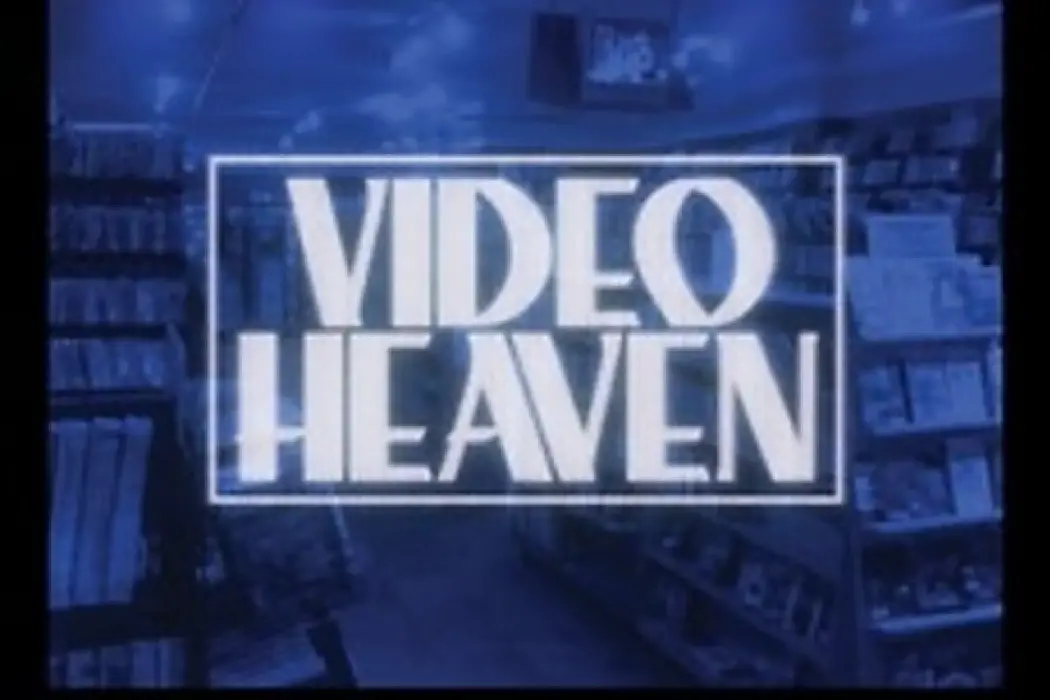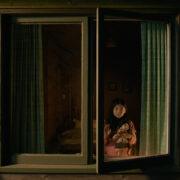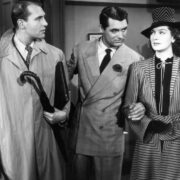Tribeca 2025: VIDEOHEAVEN

Payton McCarty-Simas is a freelance writer and artist based in…
Videoheaven is the second Alex Ross Perry film this year to run almost masochistically long. While this essay film exploring depictions of the video store in film culture–– like his meta-music doc, Pavements, before it–– is clearly a labor of love (he’s been developing it since 2014), its passion for its subject, not to mention its bloated, 180-minute duration, unfortunately overruns its baseline intellectual ambitions. By the end, though, even this passion becomes a thorn in its side, turning what presents itself as a mellow elegy for cinephiles and physical media heads into something far less friendly, Maya Hawke’s lilting narration notwithstanding.
Revenge of the Nerds Curdles VHS Nostalgia
Before digging into what the film’s actually about, though, it’s important to note what it isn’t. Contrary to how it’s been received, Videoheaven isn’t a nostalgic history of video stores per se. Broken into six parts (plus intro and conclusion) it explores the chronological rise and fall of VHS rental culture in a meta sense–– i.e. as depicted by films, television, and the media. The essay is certainly informative on the history of this now ghostly cultural practice to a point: It lays out the way that VHS came to dominate the market in the 1980s; it highlights how video rental stores provided avenues for community and knowledge-sharing and situates the geography of the stores themselves— particularly the role of the alluringly off-limits “adult” section behind a curtain— within this process; it discusses the subsequent monopolistic dominance on the market that chains like Blockbuster came to hold in the ‘90s and early aughts; it paints a tragic portrait of the death of first mom and pop video shops, then the rental experience itself, as streamers rendered their social realm obsolete and anachronistic. But a cursory YouTube search would likely provide viewers with comparably deep essays on these subjects. Videoheaven’s facts and figures are certainly well-laid out, but they’re sadly few and far between.
Revenge of the Clerks
Perhaps the most singular and odd element of this film comes in between these bursts of information. The majority of the film’s runtime is dominated by insightful if meandering, repetitive, and surprisingly rancorous thematic explications of the way different genres incorporated the video store milieu into their narrative tropes (first associating them with illicit sex and violence, then with awkward social interactions) a media analysis that takes an almost anti-nostalgic, pessimistic view of the way our culture views these spaces that strikes an odd chord. This is a movie that, for example, still sees Blockbuster (and Barnes & Noble) as a “soulless,” “anonymizing” corporate villain, never taking into account the economic landslides that have occurred since and radically shifted people’s perspectives in the intervening decades–– for many, Blockbuster was their beloved neighborhood video store, and Barnes & Noble has become a bastion of print literature in a sea of digital monoculture.
Perry then hones in on one theme in particular: Depictions of video clerks. To this day, it’s probable that most readers can picture exactly the type of character Perry is describing here. They’re an extreme film nerd, usually a slacker, (usually white, usually a man,) who wields their obsessive, esoteric movie knowledge like a cudgel against the customer. They can be cool and aloof or weird and awkward or both. They’re the guys and gals immortalized in movies like, well, Clerks, but who Perry proves (through copious, sometimes redundant case studies) remained ubiquitous throughout the ‘80s, 90s, 2000s, and even early 2010s.
Cataloguing depictions of this character and their social role is where the writer-director’s interest clearly lies. Perry was famously a clerk himself, and he highlights dozens of deep cut examples with the fanatical precision of the fictional clerks on screen. In certain moments, his fascinated, roving collector’s eye pays off dividends and makes for the best stretches of viewing: In one passage, he playfully zooms in on posters in the background of scenes to talk about the rise and fall of Troma and unpacks the cyclical meta-referentiality of movies set in video stores (a Dustin Hoffman cameo during a discussion of The Graduate in The Holiday for example). His analysis of the awkwardness of the video store’s sociality (by way of Seinfeld, Frasier, and others) is equally cogent and compelling, evoking the kind of deep, amiable cinephilia that video store nostalgia is fueled by in the first place.
But these lighter moments also belie a surprising bitterness at the heart of the movie, whose argument, strangely, seems to align far closer to the paranoia of a Room 237 than the affection of a Kim’s Video or a Be Kind Rewind. After about two hours, the film comes to fixate on the “negative representation” that Perry suggests video clerks faced in the media of their heyday. In essence, Perry begins to impassionately argue that by representing the video store clerk as a mean-spirited or lazy gatekeeper, the media weakened the bonds between customer and video store, lessening American’s collective appreciation of them as an institution. This would be a compelling, well-made point were this where the argument ended–– and were it not for the fact that complaining about the treatment of “clerks” (who, as we’ve just discussed, are typically depicted as straight white nerds) on an borderline identitarian basis smacks of entitlement; the use of The Watermelon Woman near the end of the film verges on feeling like preemptive apologia for the monolithic kind of film culture on display, and huffily calling Netflix’s failed sitcom Blockbuster “insulting to all” tips the film fully into the realm of movie geek self-parody.
But the film doesn’t end its argument there. Unfortunately, Perry dons his tinfoil hat instead. The latent frustration the film evinces towards the way video stores are negatively represented in the media (from Friends dissing porn to Gilmore Girls dissing clerks) finally comes together near its close when the narration takes a turn for the full-on conspiratorial, replete with words like “forsaken,” “betrayed,” and “erased” to describe VHS rental culture, softened only by Hawke’s soothing voice (I firmly believe that were this movie narrated by Perry himself, Videoheaven would come across like a YouTube screed). With the kind of logical fallacy that’s amplified half-baked argumentation since time immemorial, Videoheaven breezily comes to suggest that the negative representation of video clerks actually ushered in the demise of the video store, a wild, ahistorical and economically oblique stance hedged only with an “It’s tempting to think that…”
Well, it’s tempting to think that this kind of argumentation is why more history and context on the subject at hand would be helpful in a film like this, but even the most casual viewer will likely see the giant, red and white digital elephant in the room here. In historical terms, streaming is only mentioned once or twice, leaving the rest of the final 45 minutes of the film’s run-time to dwell on the video store’s contemporaneous cultural underappreciation rather than its disastrous economic decline. Its cynicism runs so deep that it largely dismisses the present Y2K nostalgia wave and corresponding VHS revival that justifies its existence–– even as its twenty-six year old narrator was obviously chosen because of her role as a clerk on Stranger Things. To make matters worse, even its weirder accusations are delivered in a slow, academic cadence that denies them the heady rush that a wild-eyed passion project like this deserves.
Conclusion
So… if it wasn’t Netflix that killed the video store, who was it?
Ironically, in defending the video clerk’s honor with such defensive ferocity, Perry’s work replicates the precise qualities that he so reviles in the media depictions of his beloved avatar. Under its affable, hyper-knowledgeable exterior, Videohaven is unexpectedly resentful. “This job would be great,” it seems to be saying, cribbing a line from Clerks, “if it wasn’t for the fucking customers.”
Does content like this matter to you?
Become a Member and support film journalism. Unlock access to all of Film Inquiry`s great articles. Join a community of like-minded readers who are passionate about cinema - get access to our private members Network, give back to independent filmmakers, and more.
Payton McCarty-Simas is a freelance writer and artist based in New York City. They grew up in Massachusetts devouring Stephen King novels, Edgar Allan Poe stories, and Scooby Doo on VHS. Payton holds a masters degree in film and media studies from Columbia University and her work focuses on horror film, psychedelia, and the occult in particular. Their first book, One Step Short of Crazy: National Treasure and the Landscape of American Conspiracy Culture, is due for release in November.













